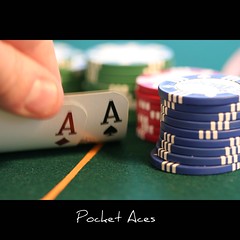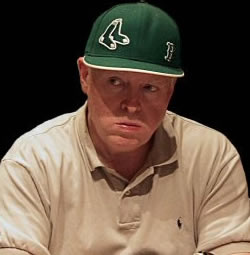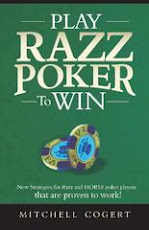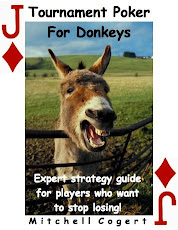 Image via Wikipedia
Image via Wikipedia
Albert Einstein said that "insanity is doing the same thing over and over again and expecting different results."
Let me ask you a question: Is your poker game so routine that someone watching you would describe you as being insane?
Stop the Insanity!
Stop playing the same way if you are not getting the results you desire.
Let me give you some specifics to help you get out of a losing poker rut.
1. No Limit poker tournament
Let's say that you are a solid player when it comes to tournaments. You often survive deep into events, but unluckily you take a bad beat or two that knocks you out.
Happen often?
You need to be more observant. Check out the players who have big stacks and learn from the moves they make.
Here is one of my favorite moves: It's in the middle of the tournament, the player to my right has been more aggressive than other players, but not super aggressive. He has shown down some big hands but usually he's taken down pots with c-bets.
I am on the button. Everyone folds to the player to my right who makes a standard 3x the big blind raise. He has $18,000 and I have $10,000. The blinds are $300-$600. He raised to $1,800. I will re-raise here to $5,400. Why?
I have been playing a solid game so my image is that of a solid player. He will see that re-raise as a premium hand like AA, KK or QQ. Unless he has a premium hand, I will take down the pot.
Do I feel uneasy making that play? Yes. Especially since all I have are the 10s-7s.
But, my opponent knows that no matter the flop, I am going to move in the rest of my chips. That $5,400 raise may actually cost him $10,000.
This is just one play you can make to take advantage of a poker situation that is not dependent on the strength of your starting hands. Try this one or try others. But, do something different to get better results.
2. Limit Cash
Here is an example for a limit ring game.
Let's say it's $2-$4 and you are playing online. The table is playing tight. Everyone folds to you. You are two off from the button (called the power or hijack position). You look down and find Ks-6c. Easy fold, right?
Yes. You can fold. But, why not try to steal with a raise?
You raise to $4. The small blind and the big blind call--not what you were hoping for.
The flop comes Qd-4c-3d.
The small blind bets. The big blind folds. What should you do?
Please don't auto-fold. Think about how you can play this hand to win the pot.
If your opponent had a Q would he bet into you? My guess is no. My guess is that he either has a hand like a middle pocket pair or maybe A-4 or A-3. Or, maybe a flush draw.
What is your best play?
Raise. Does that make you feel uncomfortable? Good. It's a sign your game is improving.
Your opponent calls.
The turn is a 5h.
Your opponent checks. What should you do?
You can take the free card, of course, but, I prefer to bet since it signals you have top pair.
Most likely, your opponent will fold or call. If he raises, you have outs, so you can call.
What happens, though, is not important. What is important is that you are trying new moves to improve your game.
Conclusion
I know getting out of your comfort zone is difficult. But, you must do it.
If you don't believe me, take it from Albert Einstein. Insanity is not profitable in poker.
![Reblog this post [with Zemanta]](http://img.zemanta.com/reblog_e.png?x-id=03dba48b-b222-437c-8111-e167b5250590)

![Reblog this post [with Zemanta]](http://img.zemanta.com/reblog_e.png?x-id=ae9d1bf0-5bab-46fc-94f6-d92317942c65)

![Reblog this post [with Zemanta]](http://img.zemanta.com/reblog_e.png?x-id=049f70df-103d-421a-8938-ad0f3eb24ae5)

![Reblog this post [with Zemanta]](http://img.zemanta.com/reblog_e.png?x-id=1b881421-1e58-40e3-8082-8cccd4d02ba8)

![Reblog this post [with Zemanta]](http://img.zemanta.com/reblog_e.png?x-id=ac0d80de-034e-4495-ae84-c69baab7043c)

![Reblog this post [with Zemanta]](http://img.zemanta.com/reblog_e.png?x-id=56d042d2-0169-4579-829d-ee80b5f73641)

![Reblog this post [with Zemanta]](http://img.zemanta.com/reblog_e.png?x-id=043ee4fe-7f1f-43c0-ad85-873c83899f79)







